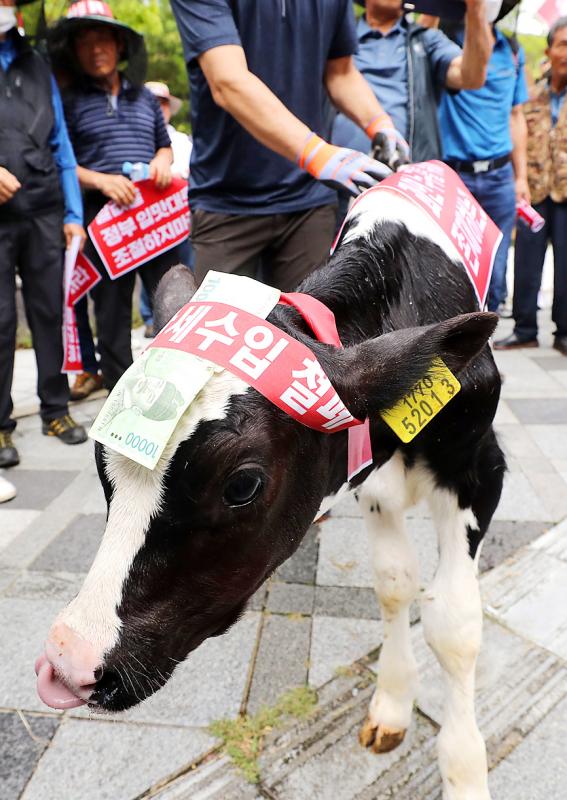South Korea’s inflation accelerated further last month, underscoring the central bank’s need to keep raising interest rates to try to rein in mounting price pressures.
Consumer prices advanced 6.3 percent from a year earlier, quickening from 6 percent in June and matching estimates, government data showed yesterday.
Bank of Korea (BOK) Governor Rhee Chang-yong said a day earlier that the central bank would likely raise rates by 25 basis points this month, while declining to rule out a bigger increase.

Photo: EPA-EFE
Policymakers expect price growth would remain elevated for a few months before beginning to decelerate.
Risks to that outlook include an intensification of Russia’s war on Ukraine or a flaring of other geopolitical flashpoints.
Inflation came in largely in line with projections and would stay above 6 percent for some time to come, the central bank said in a statement after the release.
The war, global commodity prices and summer climate conditions, such as typhoons or heat, add to uncertainties for the price outlook, it said.
The latest inflation report also showed that consumer prices rose 0.5 percent last month, compared with the prior month, with core inflation coming in at 4.5 percent versus the prior year.
The BOK’s next rate decision is on Aug. 25.
Policymakers hiked by a half-percentage point last month, joining global counterparts including the US Federal Reserve, in opting for outsized increases.
Rising consumer prices have added pressure to wages, spurring disputes between workers and employers in some of the country’s key industries, such as automobiles and shipbuilding.
“Pressure on the BOK to raise rates, like the Fed, again will be strong if previous hikes fail to suppress wage growth and oil prices rise again,” Korea Economic Research Institute economist Lee Seung-suk said. “Inflation has been causing wages to increase and now wages will start to fuel inflation,” Lee said.
He estimates inflation increases 0.6 percent for every 1 percent rise in wages.
A year into its tightening cycle, the BOK is increasingly wary of risks to the economy, including the potential for a global recession as the Fed intensifies rate increases and Russia’s war keeps energy prices elevated.
COVID-19 lockdowns in China are also piling stress on international supply chains and weakening demand for South Korean products.

SPEED OF LIGHT: US lawmakers urged the commerce department to examine the national security threats from China’s development of silicon photonics technology US President Joe Biden’s administration on Monday said it is finalizing rules that would limit US investments in artificial intelligence (AI) and other technology sectors in China that could threaten US national security. The rules, which were proposed in June by the US Department of the Treasury, were directed by an executive order signed by Biden in August last year covering three key sectors: semiconductors and microelectronics, quantum information technologies and certain AI systems. The rules are to take effect on Jan. 2 next year and would be overseen by the Treasury’s newly created Office of Global Transactions. The Treasury said the “narrow

SPECULATION: The central bank cut the loan-to-value ratio for mortgages on second homes by 10 percent and denied grace periods to prevent a real-estate bubble The central bank’s board members in September agreed to tighten lending terms to induce a soft landing in the housing market, although some raised doubts that they would achieve the intended effect, the meeting’s minutes released yesterday showed. The central bank on Sept. 18 introduced harsher loan restrictions for mortgages across Taiwan in the hope of curbing housing speculation and hoarding that could create a bubble and threaten the financial system’s stability. Toward the aim, it cut the loan-to-value ratio by 10 percent for second and subsequent home mortgages and denied grace periods for first mortgages if applicants already owned other residential

EXPORT CONTROLS: US lawmakers have grown more concerned that the US Department of Commerce might not be aggressively enforcing its chip restrictions The US on Friday said it imposed a US$500,000 penalty on New York-based GlobalFoundries Inc, the world’s third-largest contract chipmaker, for shipping chips without authorization to an affiliate of blacklisted Chinese chipmaker Semiconductor Manufacturing International Corp (SMIC, 中芯). The US Department of Commerce in a statement said GlobalFoundries sent 74 shipments worth US$17.1 million to SJ Semiconductor Corp (盛合晶微半導體), an affiliate of SMIC, without seeking a license. Both SMIC and SJ Semiconductor were added to the department’s trade restriction Entity List in 2020 over SMIC’s alleged ties to the Chinese military-industrial complex. SMIC has denied wrongdoing. Exports to firms on the list

ASE Technology Holding Co (ASE, 日月光投控), the world’s biggest chip assembly and testing manufacturing (ATM) service provider, expects to double its leading-edge advanced technology services revenue next year to more than US$1 billion, benefiting from strong demand for artificial intelligence (AI) chips, a company executive said on Thursday. That would be the second year that ASE has doubled its advanced chip packaging and testing technology revenue, following an estimate of more than US$500 million for this year. ASE is one of the major beneficiaries from the AI boom as Taiwan Semiconductor Manufacturing Co (TSMC, 台積電) is outsourcing production of advanced chip